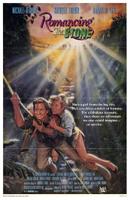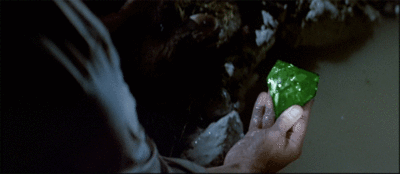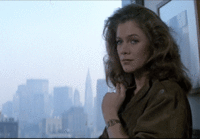Romancing the Stone
From Indiana Jones to Roger Rabbit, Duran Duran and Adam Ant (well, the whole "New Romantic" phenomenon) to Frankie Goes to Hollywood, the 1980s nurtured a taste for the cartoonish. It was a decade of larger than life figures spinning remarkable tales of get-rich schemes, brash consumerism, ecstatic entrepreneurship, and big hair.
 Romancing the Stone is an unabashed product of that heady era. Though derivative in that it trailed in the wake of Raiders of the Lost Ark, the film is one of the better Spielberg imitations, was a huge success in its own right (inspiring a sequel in The Jewel of the Nile), and made the names of figures who would go on to typify the period.
Romancing the Stone is an unabashed product of that heady era. Though derivative in that it trailed in the wake of Raiders of the Lost Ark, the film is one of the better Spielberg imitations, was a huge success in its own right (inspiring a sequel in The Jewel of the Nile), and made the names of figures who would go on to typify the period.
Director Bob Zemeckis went on to make the "Back to the Future" franchise as well as Who Framed Roger Rabbit and Forrest Gump.
Kathleen Turner, who plays the mousy Romance novelist turned adventure heroine, would star in Prizzi's Honor, Peggy Sue Got Married, and The War of the Roses. For Danny Devito, bumbling criminal sidekick, this was his first big success away from the "Taxi" and the small screen, presaging an epoch in which he seemed to star in any and every comedy that Hollywood put out. And Michael Douglas, well, Michael is still with us, though he's no longer the dashing action adventure hero that is his rather unlikely role here.
And all this thanks to a tongue-in-cheek revival of 1930s and 40s swashbuckling, mediated via the romance fiction of Mills and Boon and Harlequin, set in an Colombia of snapping alligators, uniformed goons, surprisingly literary drug smugglers, misplaced treasure maps, and a buried emerald that resembles nothing more than some hardened gelatine dessert.

The movie is, as it has to be, self-conscious and self-parodic. Douglas's character, the gun-toting Jack T. Colton, mutters to himself several times as he finds himself in yet another scrape "I knew I should've listened to my mother" and at one point adds, in a nod to the lucrative modern business of quick self-improvement, "I could've been a cosmetic surgeon, five hundred thousand a year, up to my neck in tits and ass." In short, Colton, as much as Turner's character the "hopeless romantic" Joan Wilder, is out of place and out of his depth so far from Manhattan.
The joke, however, is that not far beneath its uncivilized veneer of chicken-infested broken-down buses, dusty streets, and ragged boys in ponchos, rural Colombia boasts all the mod cons of Miami Beach or Morningside Heights.
The provincial hard man from whom Jack and Jean seek aid (a fine comic turn from Alfonso Arau) greets the pair with generosity and gusto once he realizes that this is "the" Jean Wilder, "the lady who writes the books" he reads to the rest of his gang every Saturday. As well as a prized collection of romance novels, his compound boasts hi-fi, multigym, photocopier, and a supercharged SUV, and he engineers the trio's escape by means of a nifty infrared-controlled garage door opener. Likewise, though Jack starts up conversations in Spanish, in each case he notes with increasingly accustomed surprise "Oh, that's great, you speak English too."
In brief, the Latin American jungle is here rather transparently a displaced version of the urban jungle in which Jean has unsuccessfully been searching for romance and excitement by purveying narratives of escapism in which she can imagine herself a dashing heroine partnered with a modern-day cowboy.
But it is only in Colombia, as she writes herself into an actualization of one of these exoticized fantasies ("How're you going to write yourself out of this one?" Jack asks at one tense moment), that she can live up to the social demands of someone like her New York publisher, Gloria.
 So as her adventure proceeds, Jean is progressively better prepared not for this oddly familiar Latin environment, but for the wilds of the Manhattan dating scene: her hair step by step acquires volume and a perm and she gains the confidence and entrepreneurial enterprise needed to win her man and for them both to attain the nouveau riche dream of sailing off in a brand-new leisure yacht.
So as her adventure proceeds, Jean is progressively better prepared not for this oddly familiar Latin environment, but for the wilds of the Manhattan dating scene: her hair step by step acquires volume and a perm and she gains the confidence and entrepreneurial enterprise needed to win her man and for them both to attain the nouveau riche dream of sailing off in a brand-new leisure yacht.
 Romancing the Stone is an unabashed product of that heady era. Though derivative in that it trailed in the wake of Raiders of the Lost Ark, the film is one of the better Spielberg imitations, was a huge success in its own right (inspiring a sequel in The Jewel of the Nile), and made the names of figures who would go on to typify the period.
Romancing the Stone is an unabashed product of that heady era. Though derivative in that it trailed in the wake of Raiders of the Lost Ark, the film is one of the better Spielberg imitations, was a huge success in its own right (inspiring a sequel in The Jewel of the Nile), and made the names of figures who would go on to typify the period.Director Bob Zemeckis went on to make the "Back to the Future" franchise as well as Who Framed Roger Rabbit and Forrest Gump.
Kathleen Turner, who plays the mousy Romance novelist turned adventure heroine, would star in Prizzi's Honor, Peggy Sue Got Married, and The War of the Roses. For Danny Devito, bumbling criminal sidekick, this was his first big success away from the "Taxi" and the small screen, presaging an epoch in which he seemed to star in any and every comedy that Hollywood put out. And Michael Douglas, well, Michael is still with us, though he's no longer the dashing action adventure hero that is his rather unlikely role here.
And all this thanks to a tongue-in-cheek revival of 1930s and 40s swashbuckling, mediated via the romance fiction of Mills and Boon and Harlequin, set in an Colombia of snapping alligators, uniformed goons, surprisingly literary drug smugglers, misplaced treasure maps, and a buried emerald that resembles nothing more than some hardened gelatine dessert.

The movie is, as it has to be, self-conscious and self-parodic. Douglas's character, the gun-toting Jack T. Colton, mutters to himself several times as he finds himself in yet another scrape "I knew I should've listened to my mother" and at one point adds, in a nod to the lucrative modern business of quick self-improvement, "I could've been a cosmetic surgeon, five hundred thousand a year, up to my neck in tits and ass." In short, Colton, as much as Turner's character the "hopeless romantic" Joan Wilder, is out of place and out of his depth so far from Manhattan.
The joke, however, is that not far beneath its uncivilized veneer of chicken-infested broken-down buses, dusty streets, and ragged boys in ponchos, rural Colombia boasts all the mod cons of Miami Beach or Morningside Heights.
The provincial hard man from whom Jack and Jean seek aid (a fine comic turn from Alfonso Arau) greets the pair with generosity and gusto once he realizes that this is "the" Jean Wilder, "the lady who writes the books" he reads to the rest of his gang every Saturday. As well as a prized collection of romance novels, his compound boasts hi-fi, multigym, photocopier, and a supercharged SUV, and he engineers the trio's escape by means of a nifty infrared-controlled garage door opener. Likewise, though Jack starts up conversations in Spanish, in each case he notes with increasingly accustomed surprise "Oh, that's great, you speak English too."
In brief, the Latin American jungle is here rather transparently a displaced version of the urban jungle in which Jean has unsuccessfully been searching for romance and excitement by purveying narratives of escapism in which she can imagine herself a dashing heroine partnered with a modern-day cowboy.
But it is only in Colombia, as she writes herself into an actualization of one of these exoticized fantasies ("How're you going to write yourself out of this one?" Jack asks at one tense moment), that she can live up to the social demands of someone like her New York publisher, Gloria.
 So as her adventure proceeds, Jean is progressively better prepared not for this oddly familiar Latin environment, but for the wilds of the Manhattan dating scene: her hair step by step acquires volume and a perm and she gains the confidence and entrepreneurial enterprise needed to win her man and for them both to attain the nouveau riche dream of sailing off in a brand-new leisure yacht.
So as her adventure proceeds, Jean is progressively better prepared not for this oddly familiar Latin environment, but for the wilds of the Manhattan dating scene: her hair step by step acquires volume and a perm and she gains the confidence and entrepreneurial enterprise needed to win her man and for them both to attain the nouveau riche dream of sailing off in a brand-new leisure yacht.
